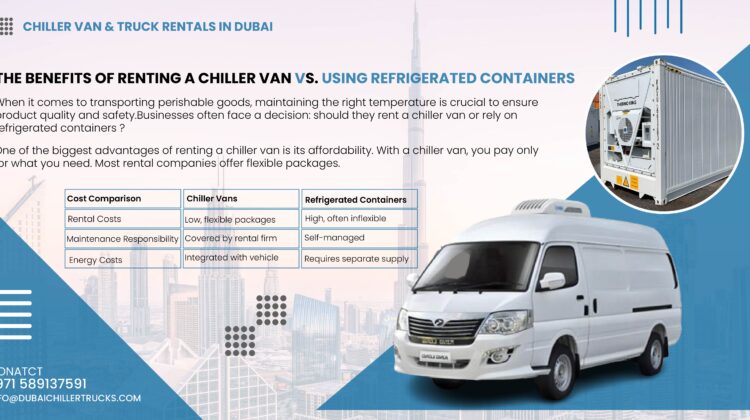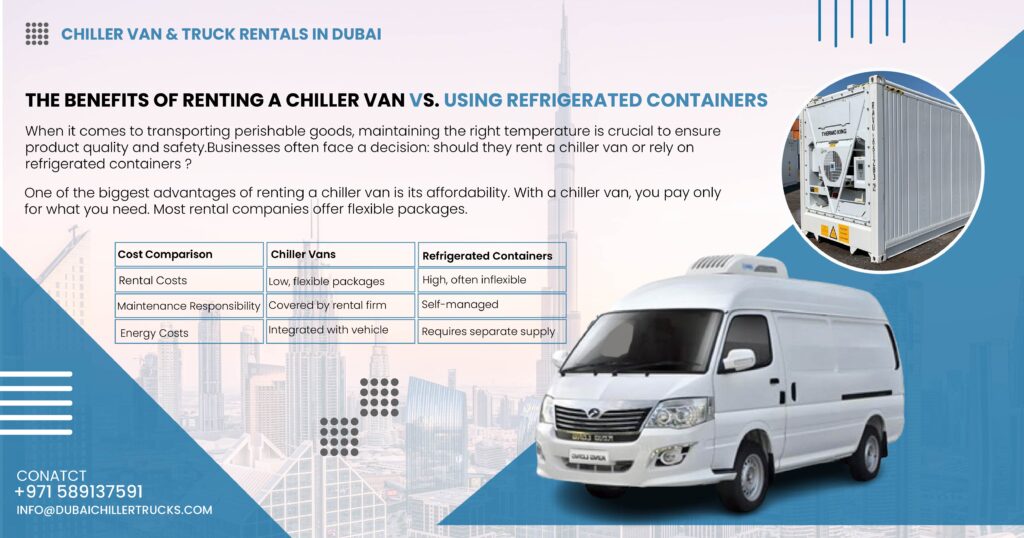
The Benefits of Renting a Chiller Van vs. Using Refrigerated Containers
When it comes to transporting perishable goods, maintaining the right temperature is crucial to ensure product quality and safety. Businesses often face a decision: should they rent a chiller van or rely on refrigerated containers? Both options have their unique advantages, but the right choice depends on your specific needs, such as mobility, cost, and storage capacity.
This article explores the benefits of renting a chiller van compared to using refrigerated containers, helping you make an informed decision for your business.
Table of Contents

1. Cost Efficiency
Rental Costs
One of the biggest advantages of renting a chiller van is its affordability. With a chiller van, you pay only for what you need. Most rental companies offer flexible packages, such as daily, weekly, or monthly rentals, allowing you to manage costs effectively.
Refrigerated containers, on the other hand, often involve higher upfront costs, including installation, electricity, and storage space. For businesses with limited budgets, these extra costs can be a significant burden.
| Cost Comparison | Chiller Vans | Refrigerated Containers |
|---|---|---|
| Rental Costs | Low, flexible packages | High, often inflexible |
| Maintenance Responsibility | Covered by rental firm | Self-managed |
| Energy Costs | Integrated with vehicle | Requires separate supply |
Hidden Expenses
Refrigerated containers may require additional expenses, such as power generators, long-term leases, and repair services. In contrast, rental companies typically handle maintenance and repairs for chiller vans, reducing unexpected costs.
2. Mobility and Convenience
On-the-Go Refrigeration
A chiller van offers the advantage of mobility. It can transport goods directly from one location to another, making it ideal for businesses with dynamic delivery needs. Whether you’re delivering groceries, flowers, or medical supplies, a chiller van ensures that your products stay fresh throughout the journey.
Stationary Use
Refrigerated containers are designed for static storage. While they are effective for bulk goods that don’t require frequent movement, they are unsuitable for businesses that rely on regular deliveries. For instance, if you need to transport perishables across multiple locations, opting for a refrigerated truck rental in Ajman would be a more practical solution, eliminating the need for additional logistics like a separate truck or trailer.
3. Energy Consumption
Chiller Vans
Chiller vans come with integrated refrigeration systems powered by the vehicle itself. This eliminates the need for external energy sources, making them both convenient and cost-effective.
Refrigerated Containers
In contrast, refrigerated containers rely on external electricity or fuel-powered generators to maintain temperature. This can lead to higher energy costs and challenges in remote areas where power may not be readily available.
| Aspect | Chiller Vans | Refrigerated Containers |
|---|---|---|
| Energy Source | Vehicle-powered | Requires external power |
| Cost Impact | Lower operational costs | Higher due to energy use |
| Environmental Impact | Lower carbon footprint | Dependent on generator usage |
4. Storage Capacity and Scalability
Capacity Comparison
Chiller vans are typically smaller in size, making them suitable for small to medium loads. They work well for businesses that need flexibility in delivery volume.
Refrigerated containers, however, are designed for bulk storage, making them ideal for large-scale operations or static storage at distribution hubs.
| Feature | Chiller Vans | Refrigerated Containers |
|---|---|---|
| Capacity | Limited, mobile | Large, stationary |
| Ideal For | Small-medium businesses | Bulk storage needs |
Scalability
Chiller vans offer better scalability for growing businesses. You can rent more vans as needed without committing to long-term investments. Refrigerated containers, by contrast, require permanent space and higher initial setup costs, making scalability less practical.
5. Maintenance and Repairs
Chiller Vans
When renting a chiller van, the rental company typically handles maintenance and repairs. This means you won’t have to worry about unexpected breakdowns or costs, allowing you to focus on your business.
Refrigerated Containers
For refrigerated containers, maintenance is usually the user’s responsibility. Repairs can be time-consuming and costly, especially if the cooling system fails, putting your goods at risk.
6. Flexibility in Usage
Chiller Vans
Chiller vans are incredibly versatile. They can be used for a variety of purposes, including:
- Food deliveries for restaurants or catering businesses.
- Medical supply transport, ensuring temperature-sensitive products remain effective.
- Flower deliveries, maintaining freshness and fragrance.
Refrigerated Containers
Refrigerated containers are best suited for single-location needs, such as temporary storage at warehouses or event venues. They lack the adaptability required for businesses with frequent transportation needs.
7. Safety and Temperature Control
Chiller Vans
Chiller vans come equipped with modern refrigeration systems that maintain a consistent temperature throughout transit. They are designed to handle bumps and movement, ensuring that goods remain safe and fresh.
Refrigerated Containers
While refrigerated containers provide excellent temperature control for static environments, they are more vulnerable during transport unless paired with a proper delivery mechanism.
FAQs
- Which is cheaper: renting a chiller van or using a refrigerated container?
Renting a chiller van is often cheaper due to its flexible rental packages and lower energy consumption. - Can refrigerated containers be moved easily?
No, refrigerated containers are stationary and require additional logistics for transportation. - What is the ideal option for small businesses?
Chiller vans are ideal for small businesses due to their cost efficiency and mobility. - Do chiller van rentals include maintenance?
Yes, most rental companies cover maintenance and repairs as part of the rental agreement.
Conclusion
Opting for a freezer van for rent in Abu Dhabi is an excellent choice for businesses that prioritize mobility, flexibility, and cost efficiency. It is particularly suitable for dynamic delivery needs, offering convenience and reliability. On the other hand, refrigerated containers are better for bulk storage in stationary locations but come with higher costs and less adaptability.
In cases of emergency refrigerated transport, chiller vans provide a quick and efficient solution to ensure perishable goods remain fresh during urgent deliveries. By understanding the unique benefits of each option, you can select the solution that best meets your business needs while ensuring the quality and safety of your products.

